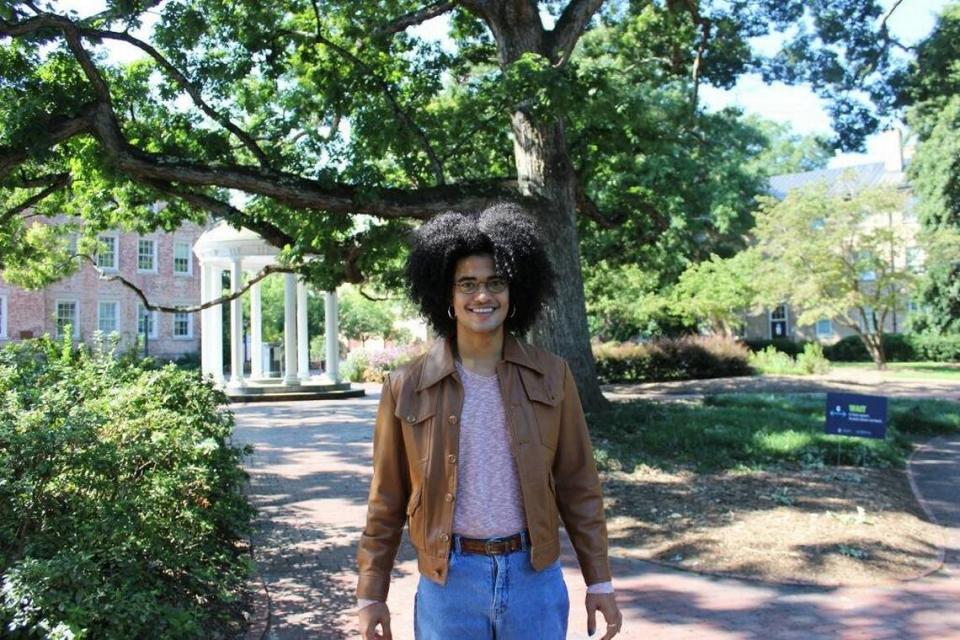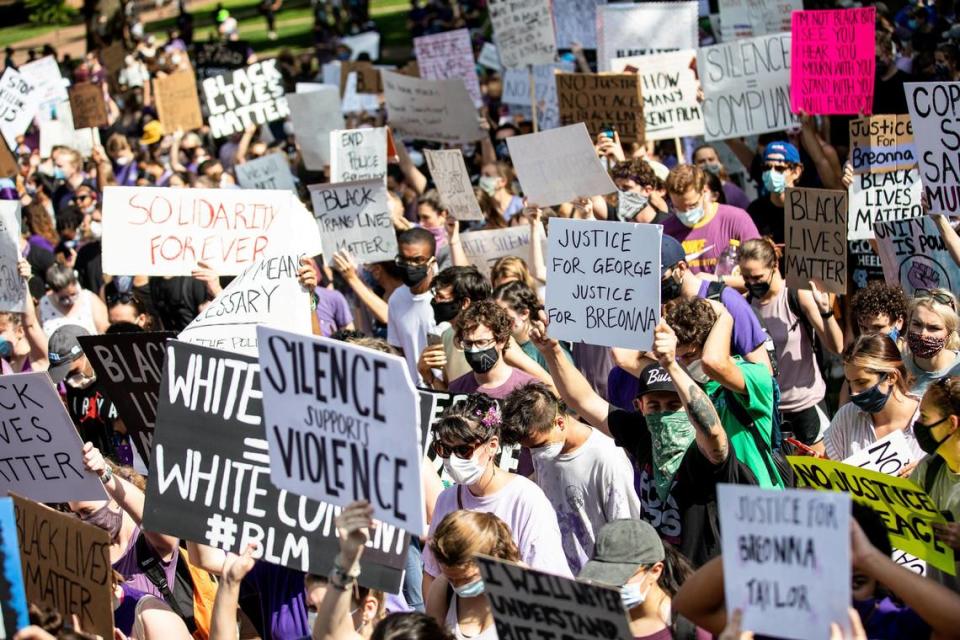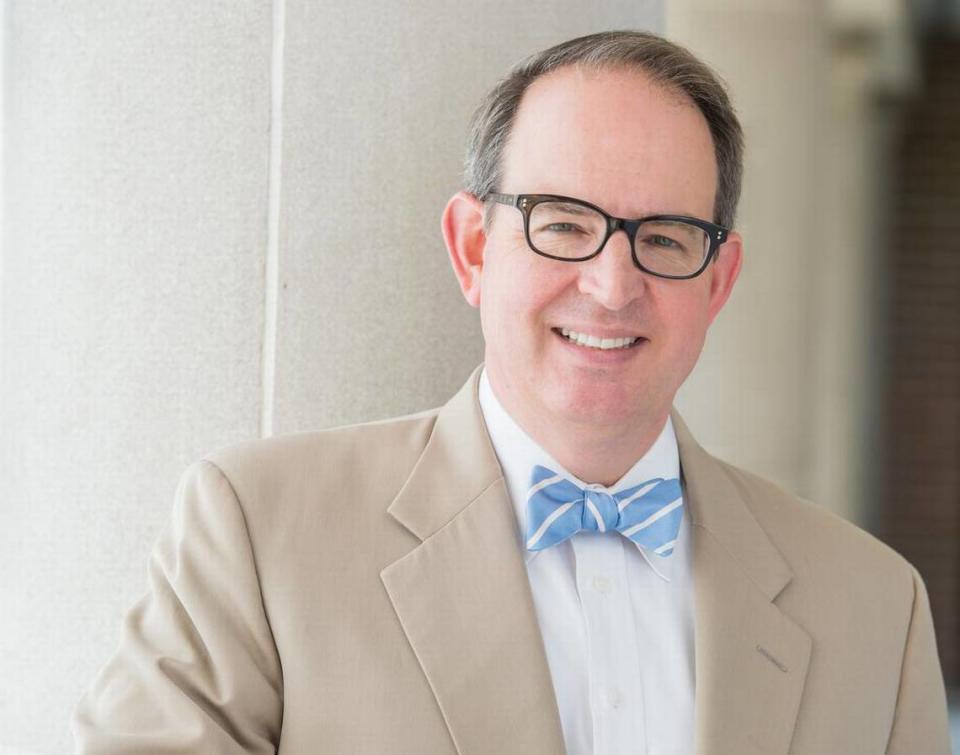UNC Law addressing concerns after student reported racial harassment in class on Zoom
UNC-Chapel Hill law students are pushing the school to confront institutional racism and a lack of diversity and equity after an incident last month on a Zoom class where a student of color says he felt racial harassment by a white student.
On Jan. 14, students in a first-year law class were discussing colonialism during a session over Zoom. Using the chat function, they debated the history of indigenous people’s land rights, including the violent actions of European colonizers and tribal warfare among native people.
At one point a white student claimed that people live with a degree of privilege in America because of European conquest.
Zachary Boyce, who identifies as Afro-Indigenous, questioned that saying, “Oh I live in privilege? Tell me more about my privilege.”
“You are an American attending an elite law school in the 21st century. If you are looking for a good cause, you can always travel to Cameroon and fight the colonizers there,” the other student wrote, according to a written transcript of the Zoom chat provided by Boyce.
Another student chimed in to say that while they may disagree, students should be respectful of each other.
Boyce responded by saying “Did you just tell me to go back to Africa?”
The white student replied “What? Dude, what are you saying?” and then continued to explain his point that “if you want to fight colonization, there are actual civil wars occurring now between natives and colonizers (like in Cameroon).”
Boyce did not publicly identify the white student. The News & Observer reached out to the student but did not hear back.
After a few more exchanges, Boyce said to the other student, “Your point is racist.”
The other student asked Boyce to explain.
Boyce said that’s when the professor jumped in and essentially ended the chat conversation.
“Initially, I was panicked, I was frightened. I knew that I was encountering racism immediately,” Boyce told the News & Observer.
Boyce said while some students came to his assistance, others supported the other student “to invalidate me and to add on to the narrative of white supremacy that he was targeting me with.”
“I felt shame. I felt dehumanized,” Boyce said. “I felt like Carolina Law is not a place that wants to safely foster the professional and personal development of Black students and students of color.”

Diminishing students concerns
Boyce reached out to the Black Law Student Association to ask whether any other students had experienced similar situations in classes and to get advice on how to handle it through the school.
He reported the incident to administrators and spoke with multiple UNC staff members with the Equal Opportunity and Compliance Office about what happened as part of a potential investigation. More than a month later, Boyce said he hasn’t heard an update about a decision to launch a formal investigation The process has been “useless” and he and the other student still take online classes together every week, Boyce said.
“I have to show up to class and talk in front of him and pretend I’m not anxious or afraid, in my own home while I’m learning, that something like that won’t happen to me again,” Boyce said.
He doesn’t want an apology or for the other student to be kicked out of the law school. He wants the law school to implement an immediate and retroactive pass/fail grading system for last fall and this spring semester. Boyce said that would help level the playing field for students of color.
As an elected student senator representing the law school in the UNC-CH Graduate & Professional Student Federation, Boyce also wants UNC administrators to address his recent legislation regarding UNC Law’s legacy and curriculum.
And he expects Law School Dean Martin Brinkley to take further steps regarding the Black Law Student Association’s demands outlined in a June 2020 letter sent to administrators in the wake of George Floyd’s death. Those include creating a UNC Law Office of Diversity and Inclusion, hiring more Black professors and mandating a “Critical Race Theory” class in the law school curriculum.

Over the summer, law students also publicly expressed their concerns about the “lack of support and culture of antipathy towards Black students,” The Daily Tar Heel reported. A group of Black students published a letter criticizing the law school’s environment, Brinkley’s response to George Floyd’s death and the UNC Center for Civil Rights losing its ability to litigate.
In response, the law school acknowledged it had work to do and later announced a resolution on faculty diversity and a review of the law school’s practices that included a $1 million commitment Brinkley said would go toward changes.
Boyce said the administration hasn’t done enough.
“It never gives us an action plan,” Boyce said.
Law students take action
Sloan Hampton Taylor, a third-year law student and social action chair for the UNC chapter of the Black Law Students Association, said Boyce isn’t alone.
“For a lot of Black students and brown students, this isn’t a new thing,” Taylor said. “And a lot of times what happens is things will be said in a classroom and it’s like a dog whistle.”
On its face, a comment or action might not seem harmful or outright racist, Taylor explained. Some things are obvious and overt, he said, but there are also subtle racist actions and microaggressions that need to be addressed in order to move forward.
“How is the law school going forward going to ensure that Black students and brown students can engage in these conversations in class … and when [a racist incident] happens the professors have a toolkit to address what happened ... and make sure the law school is for everybody,” Taylor said.

Elise Jamison, a UNC law student leader, sent out an email to other law students addressing concerns about the “racist remarks made by a member of the 1L class” and the lack of response from the professor and administration.
“This is a clear and flagrant act of racial harassment and it is appalling that this student has not been held accountable and measures have not been taken to prevent further comments of this nature,” Jamison wrote.
She shared an online petition and a letter from the members of the UNC Law Class of 2023 demanding that the administration condemn racial harassment in the classroom environment and address the incident.
The letter describes the impact of allowing these types of comments, saying some students are afraid of speaking up during class.
The students asked that new rules be implemented for law school classes on Zoom for the rest of the semester. They want students to be able to choose which breakout groups they can join for in-class discussions, particularly because those conversations can’t be recorded.
On Sunday, a letter signed by an anonymous group of other UNC law students was posted on Facebook. It defended the student it says was “labeled as ‘racist’ by activist groups” and discusses what it calls “omnipresent cancel culture” at UNC’s law school.
The letter, which was shared with The News & Observer, said the exchange was “taken out of context and misquoted” in saying that a law student told his peer to “return to Africa.”
“This cancel culture is a form of bullying that has normalized silencing people without engaging each other in good faith,” the letter said. “Those who stand up to this bullying are vilified.”
UNC Law School response
In a letter to the law school community Friday evening, Brinkley acknowledged the incident, saying “students engaged in a discussion around racial issues in which some students felt attacked and offended.“
He said the professor and the administration are “addressing the situation” with the individuals who are involved. He said the Law School administration can’t fully disclose information about what action has been and is being taken, citing the Family Educational Rights and Privacy Act.

Brinkley described how he and others have been having “long overdue and painful conversations about structural and systemic racism — in our nation, on this campus and in this law school.”
“Many of the roots of structural racism can be found in legal arrangements designed to perpetuate white power and oppress persons of color,” he wrote.
Brinkley said law students, faculty and staff must step up to confront that history in the classroom and while pursuing careers.
“Our school will continue to equip future lawyers with an awareness of historical unfairness within the legal system, as well as with tools for dismantling the remaining vestiges of injustice and inequity in our society,” Brinkley wrote. “We will do this while fostering an inclusive learning environment that welcomes and values diverse perspectives, backgrounds, and lived experiences.”
The Black Law Students Association is hosting a Town Hall with Brinkley and other Carolina Law community leaders Wednesday night to discuss the issues and solutions outlined in the June 2020 letter to the law school’s administration and faculty. The event was scheduled weeks before this recent incident took place, but student leaders say it will be addressed at the meeting.

